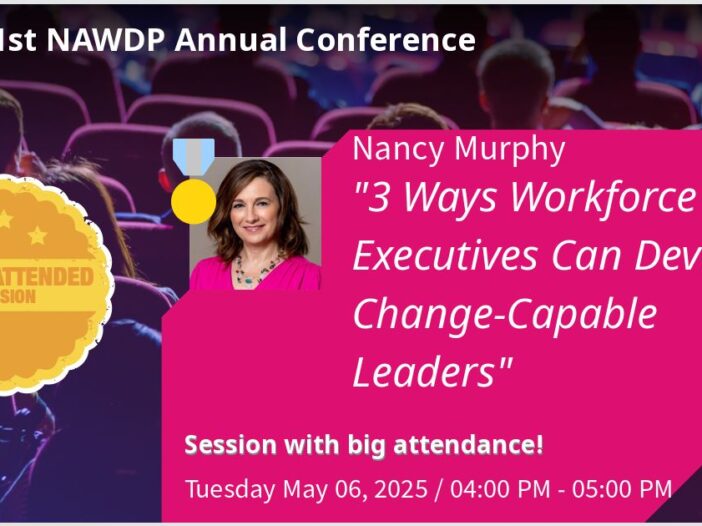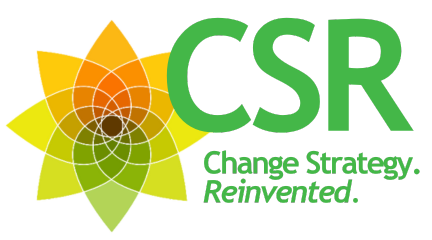
An interview with Nancy Murphy, CEO of CSR Communications, and Shadae Hospedales, Assistant Director and Chief of Administrative Operations at Baltimore City Mayor’s Office of Employment Development (MOED), ahead of their session at the 41st annual National Association of Workforce Development Professionals conference.
Nancy Murphy: We’re here today to give a preview of our upcoming session at the National Association of Workforce Development Professionals conference. The gathering is like a who’s who in workforce development, and we’re honored to be part of it.
Shadae, you’ve got a lot on your plate at MOED, including supporting those mid-level managers inside your organization. Given the current environment we’re all operating in, what are some of the biggest stressors you’re seeing in those middle managers? How are folks navigating through all this change?
Shadae: I’ve seen that our mid-level managers are under significant pressure in today’s dynamic environment, including shifting workforce trends. We’re still dealing with the after-effects of COVID, then the collapse of the Key Bridge in 2024, and major federal layoffs that we’re seeing now. There’s a constant need for us to adapt to our environment. Our mid-level managers have the pleasure of being in the middle—they have to balance the strategic demands of our senior-level management along with the operational demands of frontline staff.
We’ve found it’s really helpful to our managers when they have support, whether from our leadership or their peers, and through upskilling and re-skilling. There’s so much value in investing and taking the time to develop these people leaders, especially as it pertains to change management.
Nancy: Given all this re-skilling and up-skilling that you know is so important, and with your experience in both the private sector and government, what are some of the biggest mistakes or failures that you see organizations make when it comes to typical training programs?
Shadae: I’ve definitely learned a lot of lessons in training initiatives in both the private and public sectors. One of the main ones I’ve seen is a lack of real-world examples, specific to the participants. I always experience a cringe moment when I’m implementing a training or sitting in on a training and I hear a participant say, “That’s great, but in that example they have X, Y, Z, and we don’t. So, I don’t know how I’m going to use this information. It doesn’t apply to me.”
Even if someone enjoys the training and has the best intentions to follow through, if they don’t see how they can apply it to their day-to-day work, then it’s going to go unused and be forgotten.
Another mistake is the one-size-fits-all approach. With limited resources, it’s tempting to host one training for leaders at multiple levels in the organization, but what’s relevant for newly-promoted managers doesn’t always resonate with seasoned senior leaders. The content ends up falling flat for most and leaving participants skeptical of future training, which means wasted money.
And then my biggest pet peeve is training without follow-up. I’ve been part of really great classes in the past, and I remember them being great. But if you ask me what that training was about two years later, I probably can’t tell you. It’s really important to have accountability, whether it’s a post-training project or having your manager ask you about the training and hold you accountable to implementing that you learned.
Nancy: I’m sure others reading this are thinking, “Oops, we’ve done that too!” It’s ok. This is how we all learn and improve. Speaking of improving over time, what’s one thing you’re proud of at MOED?
Shadae: I’m super proud of not just how we manage our team, but how we mobilize and empower them. Now we’re focused on not only how to better support staff, but how to build rapport and trust in a time of change through professional development. A lot of us do really amazing work, and by taking the time to develop our staff, we’re able to empower them to continue making the work that we do possible in the first place.
Nancy: In our session, we’ll cover the four common mistakes that undermine the ROI of training and a new framework that guarantees growth. If you’re attending the conference in Virginia Beach, May 5th through 7th, join us for “Three Ways Workforce Executives Can Develop Change-Capable Leaders” in suite 2C and D on Tuesday, May 6th at 4 p.m. We hope to see you there!
_______________________________________________________________
If you’d like to learn more about how we work with organizations to boost their change management capabilities, please contact us here.
This interview has been edited for clarity and length. Nancy Murphy and Shadae Hospedales presented this topic at the 41st annual National Association of Workforce Development Professionals conference.



